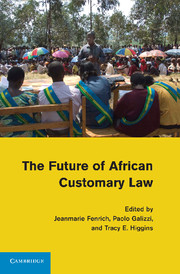14 results
18 - Customary Law, Gender Equality, and the Family
-
-
- Book:
- The Future of African Customary Law
- Published online:
- 05 February 2012
- Print publication:
- 18 July 2011, pp 423-445
-
- Chapter
- Export citation
Part Five - Customary Criminal Law
-
- Book:
- The Future of African Customary Law
- Published online:
- 05 February 2012
- Print publication:
- 18 July 2011, pp 361-362
-
- Chapter
- Export citation
Part Six - Customary Law, Human Rights, and Gender Equality
-
- Book:
- The Future of African Customary Law
- Published online:
- 05 February 2012
- Print publication:
- 18 July 2011, pp 421-422
-
- Chapter
- Export citation
Part Two - Ascertainment, Application, and Codification of Customary Law
-
- Book:
- The Future of African Customary Law
- Published online:
- 05 February 2012
- Print publication:
- 18 July 2011, pp 81-82
-
- Chapter
- Export citation
Index
-
- Book:
- The Future of African Customary Law
- Published online:
- 05 February 2012
- Print publication:
- 18 July 2011, pp 517-544
-
- Chapter
- Export citation
Acknowledgments
-
- Book:
- The Future of African Customary Law
- Published online:
- 05 February 2012
- Print publication:
- 18 July 2011, pp xvii-xviii
-
- Chapter
- Export citation
Frontmatter
-
- Book:
- The Future of African Customary Law
- Published online:
- 05 February 2012
- Print publication:
- 18 July 2011, pp i-iv
-
- Chapter
- Export citation

The Future of African Customary Law
-
- Published online:
- 05 February 2012
- Print publication:
- 18 July 2011
Notes on Contributors
-
- Book:
- The Future of African Customary Law
- Published online:
- 05 February 2012
- Print publication:
- 18 July 2011, pp ix-xvi
-
- Chapter
- Export citation
Introduction
-
-
- Book:
- The Future of African Customary Law
- Published online:
- 05 February 2012
- Print publication:
- 18 July 2011, pp 1-6
-
- Chapter
- Export citation
Part Three - The Role and Power of Traditional Authorities
-
- Book:
- The Future of African Customary Law
- Published online:
- 05 February 2012
- Print publication:
- 18 July 2011, pp 225-226
-
- Chapter
- Export citation
Part One - The Nature and Future of Customary Law
-
- Book:
- The Future of African Customary Law
- Published online:
- 05 February 2012
- Print publication:
- 18 July 2011, pp 7-8
-
- Chapter
- Export citation
Contents
-
- Book:
- The Future of African Customary Law
- Published online:
- 05 February 2012
- Print publication:
- 18 July 2011, pp v-viii
-
- Chapter
- Export citation
Part Four - Customary Land, Property Rights, and Succession
-
- Book:
- The Future of African Customary Law
- Published online:
- 05 February 2012
- Print publication:
- 18 July 2011, pp 293-294
-
- Chapter
- Export citation

